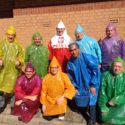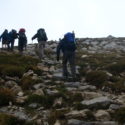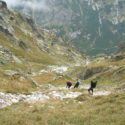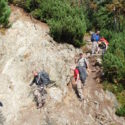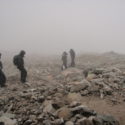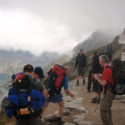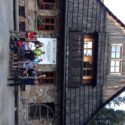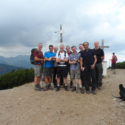This 6-day mountain walking expedition took place in the Tatra mountains of Poland with 9 members of the Army Reserve unit, 208 Field Hospital which is based in Liverpool. The aims and benefits of this type of expedition is to develop individual courage and leadership skills through controlled exposure to risk in a challenging outdoor environment, in order to enhance Operational Capability.
The Tatra’s are a rugged, rocky mountain range to an altitude of 2499 metres or 8200 feet which stretch from Poland to Slovakia, containing a variety of wildlife including wild bears, which the team encountered on the trip! The team trekked for 6 days along a route which mainly formed the border between the two countries. Each team member carried all their own equipment for the duration which was a challenge in itself and individually took turns in navigating the terrain under the watchful eye of the expedition leader.
The Tatra mountain region was set up as a National Park in the 1950’s to protect the flora and fauna especially the Ibex mountain goats, eagles and bears. Camping is therefore not allowed so the team used the mountain huts which are located in positions ideal for walking the region. These huts range from basic facilities to those that are quite comfortable, however the team were unable to get space on one night and had to sleep outside on the ground under the stars; it only rained a little! The huts also have wire fences around them which have electricity passing through which keep the bears away.
Each day the team took breakfast of bread, cheese and ham and started the days trekking. As each hut is in a valley the first part of the morning was to climb out of the valley up on to the ridges of the national borders. For the first 3 days the weather was excellent with great visibility and the scenery was stunning although the ridge walking could be exposed at times.
The afternoon descent from each of the ridges down to the next hut was typically steep with tricky rock sections which required hands and feet and on occasion a lot of loose scree rock. On arrival at the hut a full meal was provided early which the team found strange at first but became accustomed to. Then early evening a supper was served which was either a savoury or sweet dish.
Accommodation comprised of bunk beds with each person using their own sleeping bags. If the huts become full, they will give you a sleeping roll mat to use either in communal areas or if safe to do so outside! Each day of the trek had a similar routine.
The trekking each day had its own rewards and one highlight was when the team encountered a bear at about 50 metres away! Fortunately it was more interested in eating the local vegetation rather than us! The team took some photos which accompany this report.
The weather had turned during the second half of the trek so the team had rain and colder temperatures to deal with. Many of the rocky paths are made from limestone which becomes highly ‘polished’ with the wear and tear of walkers and become extremely slippery to walk on. The team were lucky during this section as most paths were granite and afforded better grip, however most of the team had lucky escapes from the occasional falling over!
The final days trek was to climb Mount Rysy at 2499 metres, the highest mountain in Poland, but due to the lowering temperatures, driving rain turning to snow, the team were unable to summit and the highest point reached was 2300 metres, just short of the elusive peak. During the attempt there were sections of rock with chains attached to assist ascent and descent, but with the snow falling, these chains were like holding blocks of ice!
At the point reached, the team laid some poppies with the expedition leader saying a prayer and giving a reading for a past unit member that had fallen and died at this same spot. The team had some time in city of Krakow with some visiting city attractions and some going to the museum at Auschwitz-Birkenau which was both educational and moving.
The expedition was a great success and many thanks to the Ulysses Trust for their grant.
Major Glen Martin

